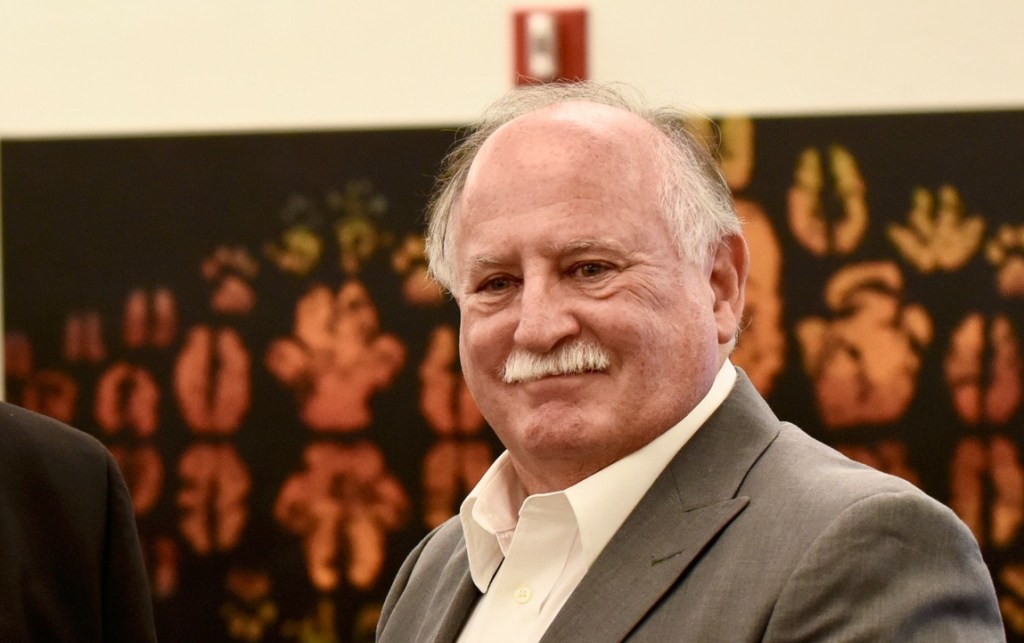
Starcevic/Getty Images

Audio By Carbonatix
Sedona is one of Arizona’s best-known gems. Smack dab in the middle of a coniferous Great Basin forest and surrounded by stunning red mountains, it’s a veritable paradise of the Southwest. Though it has only 10,000 residents, 3 million tourists visit yearly to take in its natural beauty, luxurious spas, iconic hiking trails and glamorous arts stores.
Visiting paradise seems to be easier than governing it, though. On Tuesday, Sedona Mayor Scott Jablow announced his immediate resignation, bringing an end — for now — to a months-long soap opera engulfing city hall and the Sedona Police Department. Jablow and Sedona Police Chief Stephanie Foley had feuded, each trading HR complaints about the other, and the Sedona City Council had censured Jablow two weeks earlier, pressing for his resignation.
At the time, Jablow insisted he would remain in office until the end of his term, which is next fall, in order to leave the decision on his fate to voters. In a resignation press release issued on Tuesday, Jablow had clearly changed his tune.
“It’s time for new voices to step forward,” Jabow said, per the release.
Jablow declined to comment to Phoenix New Times.
Jablow was elected as mayor in 2022 after decades spent in other roles in city government, including eight years on the city council and three decades in law enforcement. Despite that experience, and perhaps because of it, Jablow frequently ruffled feathers by apparently misunderstanding the statutory limits of his power as mayor and by frequently meddling in the operations of the Sedona Police Department and other non-elected city officials.
Since 2006, as Jablow noted in his resignation, Sedona has employed a city manager form of government, similar to Phoenix and many other Valley cities. In that model, a mayor is not a strong executive like a president or a state governor, who wield broad authority. Instead, that power is delegated to the city manager, who essentially runs the city while the mayor and city council conduct high-level oversight.
As evidenced by complaints against him, Jablow regularly overstepped those bounds, pestering city and police officials with requests and directives independent of the other members of the city council. In the complaint Foley filed against Jablow — which ran 157 pages, largely due to a host of emails she included as exhibits — she showed that he routinely circumvented her authority by reaching out to her underlings to insert himself into the department’s operations.
“Over the past three years, since being promoted to the position of Chief of Police, I have endured constant and continuous scrutiny, micromanagement, and undermining of my position of authority by Mayor Scott Jablow,” Foley wrote. “This harassment includes ongoing interfering with day-to-day operations within the police department and attempts to intervene with police department policy. lt is my opinion that this is gender-based discrimination by Mayor Scott Jablow, since I am a female Police Chief.”
Foley declined to comment on the complaint to Phoenix New Times.
Jablow also ran afoul of multiple city managers in this way. In a 2023 email to Foley from former city manager Karen Osburn, which was included in Foley’s complaint, Osburn wrote, “I will do everything I can to keep the Mayor and others from getting into the weeds in yours or any dept.” In an email to Jablow from February 2024, Osburn pleaded with him to butt out of the police department’s affairs. “The relentless micromanagement and persecution of the police department has to stop,” she wrote. “Please.”
On Aug. 17, current city manager Anette Spickard sent the city council a 30-page memo accusing Jablow of “manipulating” her into installing Flock license plate reader cameras, which the city controversially began using without telling the public or the city council. The council later voted to remove the cameras after public backlash. In her memo, Spickard wrote that Jablow had “damaged my credibility and professional reputation” by failing to take “responsibility for the direction on this project.”
On Sept. 10, the city council voted 5-2 to censure Jablow for “interference with city staff/departments,” “creating/fostering a hostile work environment,” “breaking the confidentiality of attorney/client privilege,” “circumvention of city council process,” “acting beyond the authority of the office of mayor,” “acting unilaterally,” and “violating principles of ethical conduct for elected officials.” The council also requested that he resign, which Jablow refused to do at the time.
As recently as last week, Jablow was still stridently defending himself. In a Sept. 23 press release, he acknowledged the censure but accused the councilmembers who voted for it of having an ulterior motive. “In my opinion, the five Councilors who supported this action were attempting to stop me from speaking out and asking questions about some serious allegations that were identified in a May 22, 2024, investigation into the unequal treatment of our Employees,” Jablow wrote.
In his resignation letter, Jablow did not touch upon those issues. Instead, he referenced the meddling that led to calls for him to step down. “Sometimes my direct approach tested the boundaries of our City Manager form of government,” he wrote, “but it always came from a place of putting residents first.” It also included a tacit admission that running the city on a day-to-day level was not his job.
“Since Sedona shifted to an elected Mayor in 2006, the position has naturally encouraged candidates to campaign with strong visions and act as though the office carries executive power,” he wrote. “But in reality, our professional City Manager oversees the city’s daily operations.”

City of Sedona Facebook Page
Police dysfunction?
The appropriateness of his involvement aside, Jablow clearly harbored reservations about the culture and leadership of the Sedona Police Department, which Foley has led since August 2022. And there does appear to be some fire under that smoke.
Jablow filed a four-page complaint against Foley after she filed her July 27 complaint against him. (As of Sept. 22, neither had been resolved, according to the city.) That was the second recent complaint filed against the police chief, the first coming from one of her deputy chiefs, Ryan Kwitkin, which a human relations investigation, conducted by a contracted consulting firm, found to be without merit.
Jablow’s complaint accused Foley of dysfunctional leadership tendencies and decisions, inconsistent handling of complaints and accountability and harassment and retaliation against him. In his Sept. 23 press release, he blasted city staff for allowing Foley to remain on duty while complaints against her, including Kwitkin’s, were investigated, which he said was in violation of standard HR practices.
“Allegedly, out of fear of retaliation by the Chief, the employees decided not to pursue their complaints,” he wrote. “Officers were uncomfortable speaking to the investigator while the Chief was still in command.”
One of those officers was Kwitkin, who the investigator notes refused to participate in an investigation against him and demanded to be provided with the transcripts of others who were interviewed. Hired away from a Florida police department by Foley in 2023, Kwitkin filed a complaint against her a year later, accusing her of fostering a toxic work environment and other concerns. After his complaint was not sustained, Kwitkin faced an HR complaint of his own and was fired, leading him to file a lawsuit against the city, Foley and other officials last November.
Kwitkin said he raised concerns about a Sedona police policy allowing volunteers to transport prisoners to the county jail, which he argued is in direct violation of Arizona law. He claimed Foley dismissed his concerns, noting that the department is “a small agency, and we cannot always have the staffing to transport our prisoners.” Jablow echoed those concerns in his communication with city and police personnel. In her complaint, Foley pointed to Jablow’s concern as an example of the mayor “injecting himself into day to day operations.”
After Kwitkin and two other police employees made their initial complaints against Foley, the city hired Revolutionary HR Consulting to conduct an investigation into Foley for eight alleged violations. Osburn, the city manager at the time, allowed Foley to remain in charge of the department during the probe, a decision Spickard did not overturn when she became city manager in April 2024. In his lawsuit, Kwitkin suggested that decision compromised the investigation and stacked the deck for Foley.
“Spickard took no actions to safeguard witnesses, ensure that the investigation was fair, nor that complainants or witnesses were not retaliated against,” Kwitkin’s lawsuit alleged. “Employees were concerned about participating in the investigation.”
Still, some who did participate in the investigation had less than glowing reviews, according to transcripts taken during an interview with HR consultant Barbara Basel. One officer said the department’s environment was “not a healthy one” and full of “a lot of unhappy, disgruntled people” who harbored “fear for, I guess, retaliation.” Another officer echoed the sentiment, calling the department “one of the top most toxic environments I’ve been in” and noting an unhealthy “us/them mentality” between the rank-and-file and command staff.
One former department official, who asked not to be named, told New Times that “it’s the leadership on top that is the cancer cell.” (Though, it should be noted, both Foley and Kwitkin would be considered leadership.) The rumors of the dysfunction in the department even reached the Arizona Police Association, which sent a letter to the Sedona City Council on Sept. 19.
“Recently, it has been brought to our attention by current and former City of Sedona employees that the Sedona police department may have a toxic and abusive work environment — including fear of retaliation for speaking up,” wrote APA executive director Joe Clure. “These complaints of possible misconduct and/or mismanagement cover police management up to and including the chief of police. This alleged situation is not new to city leadership and has been known for over a year.”
Clure asked the council to “conduct an unbiased fair, and thorough investigation of ALL alleged complaints of misconduct and aspects of the alleged leadership failures.” Jablow echoed that in his Sept. 23 press release.
“Every member of the Council had an obligation to ask questions about these allegations, but each sat on their hands while employees continued to report harassment, bullying, and a toxic workplace culture at the Sedona Police Department,” he said in his release, which never mentioned Foley by name. “In my opinion, the lack of transparency and consistency has since led to many department employees leaving prematurely.”
In his broadsides against Foley, Jablow also alluded to a rumor that Foley had a romantic relationship with an employee in the city manager’s office, leading to the end of that employee’s marriage. “Chief Foley filed a hostile work complaint against me shortly after public concerns arose regarding her alleged relationship with a City Manager’s Office staff member,” Jablow wrote in his August complaint. “The timing of (Foley’s) complaint appears retaliatory and aimed at deflecting scrutiny from her own conduct.”
In an email to New Times, Sedona spokesperson Lauren Browne did not deny that Foley had a romantic relationship with the city official in question, writing that there was no investigation because such relationships are only a violation of city policy if one employee is supervised by the other.

City of Sedona Facebook Page
Moving forward
The city’s HR consultant adjudicated the Kwitkin-Foley feud, coming down clearly on the side of the police chief. In May, the final report on the investigation into Foley was delivered to the city, finding no reason to sustain the eight claims against her.
“Kwitkin (…) alleged that Foley is passive aggressive. Foley’s communication style is direct and to the point,” the report read, claiming Kwitkin was projecting his own “feelings of discontent.”
Jablow, in his Aug. 22 complaint, claimed that the report “omitted critical details and testimony.”
A day after the report on Foley was issued, Kwitkin was placed on paid leave pending an investigation into his own alleged misconduct by the same consulting firm. Less than two months later, the investigation sustained 11 of 13 claims against him, leading to his termination. The final report on that investigation provides little detail about certain allegations, but it said Kwitkin was “aggressive” to officers and volunteers and abused his authority by asking a K-9 officer to search his home for drugs because he suspected his son of using them.
Kwitkin refused to participate in that investigation, telling New Times he did so on the advice of his attorney. His lawsuit remains ongoing.
Jablow’s time in city government, however, is over. Vice Mayor Holli Ploog will step in as acting mayor until Oct. 14, when the council will vote to appoint an interim mayor to serve through next November. Jablow also leaves a vacancy on the city council, which residents may apply to fill.
In the wake of Jablow’s resignation, several councilmembers who voted to censure him praised him for doing the right thing by stepping aside.
“I’m disappointed in how things turned out, but Scott did the right thing by resigning,” councilmember Derek Pfaff told Sedona Red Rock News. “He put the best interests of Sedona and its residents ahead of his own. He should be thanked for that.” Councilmember Kathy Kinsella told the outlet that “this episode has been an unfortunate distraction from the important issues facing our community. I hope we can now move on and work to restore public trust in local government.”
Whether that happens remains to be seen. Kwitkin’s lawsuit is ongoing, and regardless of its merits, things appear to be less than copacetic at the Sedona Police Department. For those who live in one of Arizona’s most frequented tourist towns, the drama may continue.
That drama could very well include Jablow. One way he constantly irked Foley was by filing public records requests related to police business — which, as a citizen, he was entitled to do. As mayor, Jablow may have had more leverage than the average person to press his case on those requests, but he retains that same right to information as a civilian.
“Sedona is in good hands, and I’ll continue to be a strong advocate as a citizen,” he said in his resignation announcement. “This community is my home, and my love for it hasn’t changed.”